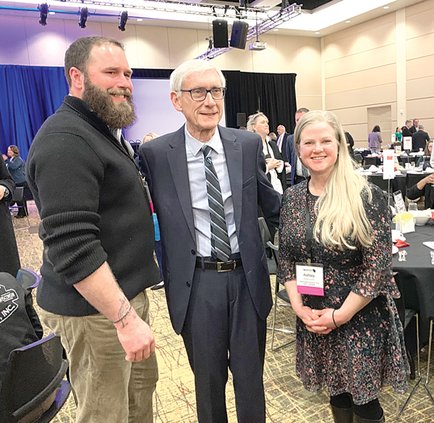I’ll tell you what, a Governor’s award in Tourism Innovation feels pretty darn good! Here’s the scoop:
There are two classes of farms emerging in the United States: Production, and Direct-to-Consumer.
Production Farming refers to large-scale, vertically-integrated, factory-type farming. You know, the shiny, sprawling operations that violate the soul and suck the environment and landscape of all that is good and nurturing. These “farms” are only getting bigger, and are absorbing mid-sized operations in exactly the same manner that income in the United States is shifting away from the middle class and being channeled to upper-income households.
By some estimates, by the year 2040, there will be fewer than 100,000 production farms across the United States, and just 5 percent of American farms will control more than 75 percent of agricultural output. “Mid-size farms are under the most financial pressure and are declining the quickest as they get bought up by larger operations,” says Aimpoint CEO Brett Sciotto in the 2019 article “Big Changes Ahead in Land Ownership and Farm Operators?”, Agri-Pulse.
This “Big get Bigger” trend is being fueled by institutional people, rather than farmers. A growing trend is for venture capitalists and pension fund investors to purchase farmland and lease it back to operators at a 5 percent return. In neighboring Iowa, more than half of the state’s farmland is owned by non-farmers, and only 6 percent of leased Iowan farmland is owned by someone who farms full time. Naturally, this outside investment corrupts the value of farmland and creates a scenario where farmland, operational costs, and the value of commodities are all priced out of the realm of obtainability for actual farmers. In a sense, outside investing is creating a type of bubble of artificiality, where prices are being set by outside forces that have little or nothing to do with the parameters of genuine agriculture.


This is nothing new. In recent years in Australia, water rights were traditionally tied to agricultural farmland. Meaning, Australian farmers were guaranteed access to irrigation water by virtue of acres farmed. For some Aussie farmers, access to water was actually more valuable than land ownership, and could be used as equity. Naturally, some muppet in a business suit decided to dissolve traditional water ownership, which opened the market to outside investors. As predictable as the next sunrise, outside investors scooped up Australian water, including Chinese investors and underfunded American pension funds. Australian farmers watched as their irrigation water flowed into pet projects, yacht clubs, dissolved in open-air outback reservoirs, and was even channeled out into the ocean. Naturally, Australian farmers revolted, and a friend of mine marched a dairy cow onto the steps of Parliament in downtown Melbourne to protest, but that’s a story for a different time.
It’s worth taking a moment to pause here to reflect on Production Farming: What is literally happening, is generational theft of farmland and the means of food production. There ought to be no doubt whatsoever — the production of food in the United States is actively being centralized, and industrialized, to benefit the few. Just as the American middle class is shrinking, so too are mid-sized farming operations.
Switching gears, the second type of emerging farm is the Direct-to-Consumer operation. Make no mistake: Consumers are watching the centralization and industrialization of our nation’s food supply, and are choosing not to support highly processed, shockingly unhealthy “food”. Shouted from the mountaintop: Veganism is the fastest-growing human lifestyle movement of all time, and more than anything else, veganism is a natural and predictable reaction to the industrialization of animal agriculture. Thus, a growing trend in agriculture is occurring at the micro level. The dirty little secret, as Production Farms become larger and more consolidated, food prices will increase. Also, food quality will decrease. This too, is as predictable as the next sunrise, and you’re already seeing it in grocery stores and declining overall health.
Consumers are making food decisions based on price, freshness, healthiness, and traceability. The pandemic fueled a desire toward homesteading amongst millennials, and traditional, family-owned farming operations will thrive into the next generation so long as they are able to pivot to Direct-to-Consumer relations, and are able to do so quickly.
I do not believe that a pivot toward Direct-to-Consumer farming deserves to be dismissed as a niche concept. My fourth-generation Wisconsin dairy farm is now entering its sixth season of hosting farmstay guests, and we are booked into August. In 2022, more than 60 percent of our bookings were repeat guests. Meaning, there is something substantial, sustainable, and desirable in food accountability. People inherently want to support the little guy, and are clearly willing to drive hours in order to do so.
Thus, it is a great honor for me to say that our small, multigenerational dairy farm was nominated for a Governor’s Choice Award in the Innovation Category in Wisconsin Tourism. As I shook hands with Wisconsin Governor Tony Evers and posed for a photo, I handed him a card advertising our farmstay. He graciously accepted, and I made the genuine offer, “Come down and visit us! We’re only 45 minutes south of Madison. I’ll show you how to milk a cow.”
I hope he does, because there is a much larger issue to be explored, and a deeper conversation to be had. For generations, we as a nation have supported consolidation and industrialization. No doubt, the abysmal state of overall American health is directly linked to Production-focused farming and highly processed food. As the saying goes, “Go big or go home.” Well, maybe it’s time for the big to go home.
— Dan Wegmueller is the owner of Wegmueller Farms and his column appears regularly in the Times. His website is https://www.farmforthought.org.





